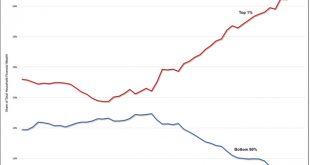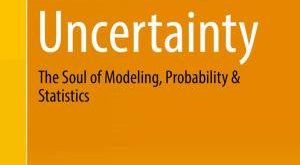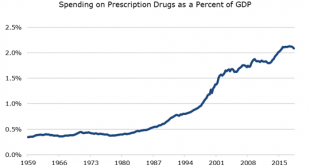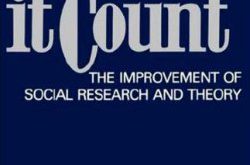from Lars Syll One of the few statisticians that yours truly have on the blogroll is Andrew Gelman. Although not sharing his Bayesian leanings, I find his open-minded, thought-provoking and non-dogmatic statistical thinking highly recommendable. The plaidoyer below for ‘reverse causal questioning’ is typical Gelmanian: When statistical and econometrc methodologists write about causal inference, they generally focus on forward causal questions. We are taught to answer questions of the...
Read More »Corporate debt will not be the basis for another financial crisis/great recession
from Dean Baker The folks who remain determinedly ignorant about the financial crisis and Great Recessioncontinue to look for another crisis where it isn’t. Much of the latest effort focuses on corporate debt. There are four big reasons why corporate debt does not pose anything like the same sort of problem that mortgage debt did during the housing bubble years. First, many companies took on large amounts of debt for a simple reason, it was very cheap. The debt was not a necessity for...
Read More »Micro-foundations for Keynesian Economics
from Asad Zaman Lecture 8A of Advanced Macroeconomics — Outline below covers the first 17m of the lecture linked below at bottom of post. 1. EXCESS Savings reduce Effective Demand, Normal Savings Do Not It seems clear that shortfalls in aggregate demand can lead to recessions, but only in presence of fixed prices. Furthermore, normal levels of savings cannot create such shortfalls – an abnormally high level of savings is required. This is because of factors discussed in “ The...
Read More »Re-estimating wealth inequality in the United States
from David Ruccio and Jamie Morgan and the current issue of RWER If we return to the World Inequality Lab, the share for the top 1 percent in the United States is higher than the global figure. It was, for example, an astounding 41.8 percent in 2012 and 35 percent in 2014 (compared to 45.3 percent for the bottom 90 percent of households) However, depending on how it is measured, actual wealth inequality may be even higher. Both the World Inequality Lab and the Federal Reserve (in...
Read More »Truth and probability
from Lars Syll Truth exists, and so does uncertainty. Uncertainty acknowledges the existence of an underlying truth: you cannot be uncertain of nothing: nothing is the complete absence of anything. You are uncertain of something, and if there is some thing, there must be truth. At the very least, it is that this thing exists. Probability, which is the science of uncertainty, therefore aims at truth. Probability presupposes truth; it is a measure or characterization of truth. Probability...
Read More »A leading economist who took Uber’s money and delivered favorable results sees his reputation tarnished
from Norbert Häring A year ago, I described how the controversial and well-financed ride-hauling platform Uber pays economists with data and money to do Uber-related research. This research invariably leads to favourable results, which can be used to fend off criticism and regulation. One such study has now been ripped apart in the Industrial & Labor Relations Review (ILR), a top journal in labor-economics. Two fearless economists, Janine Berg, senior-economist at the International...
Read More »#WhereWizardsStayUpLate – Dean Baker – 17.11.18
#WhereWizardsStayUpLate – Dean Baker – 17.11.18
US drug prices started to explode in the 1980s, contrary to what the NYT tells you
from Dean Baker Austin Frakt had an interesting Upshot piece in the NYT saying that drug spending in the US began to sharply diverge from other countries in the 1990s. This actually is not very clear, since the comparison group dating back to the 1980s is small. I am actually more struck by the explosion in spending in the 1980s, with it nearly doubling as a share of GDP over the course of the decade. Note that drug spending had not been increasing at all as a share of GDP over the prior...
Read More »Take a hard look at the skeletons in the mainstream closet!
from Lars Syll Although prepared to admit that our empirical research procedures may be based on some very shaky assumptions, [some thoughtful scholars see] no point in saying much about this unless superior alternatives are presented. I understand this concern … Nevertheless, a hard look at the skeletons in the closet is beneficial, especially when there is a propensity to keep the door locked. Nothing is gained by avoiding that which the discipline must face up to sooner or later. If a...
Read More » Real-World Economics Review
Real-World Economics Review







